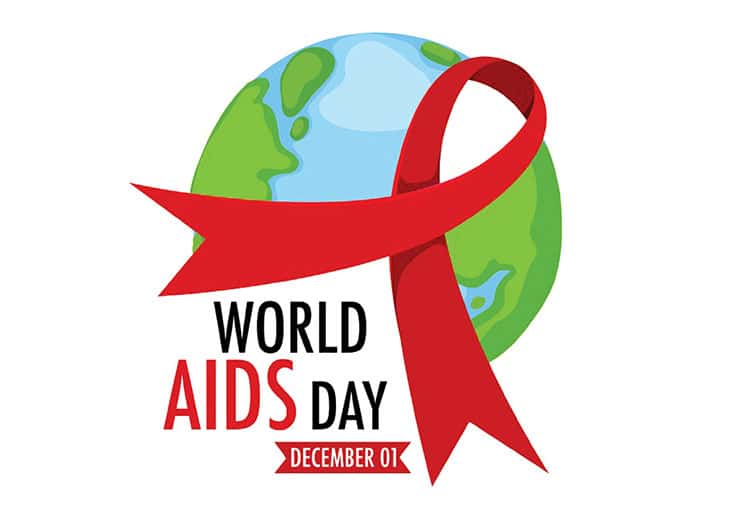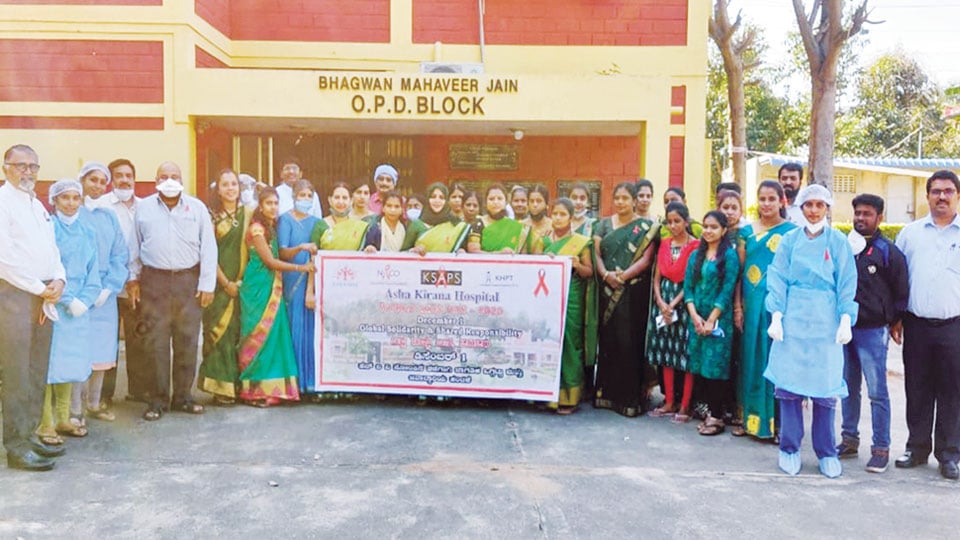Theme: Global solidarity & shared responsibility
By Dr. S.N. Mothi, Founder Trustee and Chairman of Asha Kirana Hospital, Mysuru
World AIDS Day-2020 will be like no other or like never before because it is a scenario of an ongoing challenge of HIV in the backdrop of a new challenge of Covid-19 crisis.
There is so much to learn and so much more to do. The Covid crisis has further exacerbated the newer challenges faced by people living with HIV/ AIDS. It has also widened the social and economic inequalities that increase the vulnerability of marginalised group to HIV infection. The world must find a solution to the global crisis of Covid-19 and the ongoing challenges of HIV/ AIDS and stand in solidarity and share the responsibility.
Out of 38 million people living with HIV in 2019, 12.9 million still do not have access to HIV treatment. There is a need to ensure that no one is left behind in accessing HIV treatment. Otherwise we cannot live up to the claim of “eliminating AIDS by 2030.” Health systems are to be strengthened by improving access to life-saving medicines and ensure human rights are respected. Rights of women, girls and LGBTQ (Lesbian, Gay, Bisexual, Transgender, and Queer/ Questioning)should be protected by making human rights charter gender neutral. But, the paradox is about 68 countries still have the laws which criminalises same sex sexual relations. How can we marginalise and criminalise them and make a claim “every life counts?”
Young women and girls (15 – 24 years) accounted for all new HIV infections in 2019 indicating they are emerging as the new high risk and vulnerable group in the AIDS epidemic. Lockdowns and border closures to prevent the spread of Covid caused a major hurdle in both production and transport of medicines and the abilities of patients to reach the health facility and get their medicine refills. Statistical modelling has estimated that a six-month disruption of HIV treatment could lead to additional 5,00,000 deaths from AIDS-related illness.

Current Indian scenario
In 2019 at the national level, there were an estimated 23.49 lakh People Living with HIV (PLHIV), with an adult (15 – 49 years) HIV prevalence of 0.22%.
Maharashtra had the highest estimated number of PLHIV (3.96 lakh), followed by Andhra Pradesh (3.14 lakh), Karnataka (2.69 lakh), Uttar Pradesh (1.61 lakh), Telangana (1.58 lakh), Tamil Nadu (1.55 lakh), Bihar (1.34 lakh) and Gujarat (1.04 lakh). Together, these eight States constituted 72% of the total PLHIV estimates in the country.
Nationally, the annual new HIV infections has decreased by 37% since 2010. The decline in annual new HIV infections has been noted in all States/UTs except for Tripura, Arunachal Pradesh, Chhattisgarh and Chandigarh. The highest decline has been noted in Karnataka (75%), followed by Himachal Pradesh (74%) and Andhra Pradesh (65%).
- NACO’s response to HIV/AIDS during Covid times
- NACO (National Aids Control Organisation) has to address many challenges during covid times to maintain and improve the chain of care continuum.
- To create options to collect Anti Retroviral Therapy (ART) from the nearest ART centres.
- Multi-Month Dispensing (MMD) of ART.
- Upgraded ART with a more robust Dolutegravir based regimen in accordance with WHO (World Health Organisation) guidelines.
- Provided several online training programmes for doctors, counsellors, OutReach Workers (ORW) and managerial staff.
- To keep track of treatment adherence by sending reminders for follow up.
- Additional focus on counselling PLWA (People Living With AIDS) about the importance of masks, hand hygiene and physical distancing.
- Counselling on importance of adherence to ART.
- To get swab / RT-PCR test done for covid-19 without any anxiety and fear.
Lessons from HIV/ AIDS response to guide Covid crisis
- Forty years of response to the challenges of HIV/ AIDS epidemic has generated significant experience and lessons on the importance of human rights-based approach to make a difference. Focus on Covid pandemic must be to address issues of anxiety, fear and stigma by creating a culture of solidarity and kindness.
- Should not resort to politically driven, restrictive and punitive measures. Do not label and criminalise those who breached restrictions as “super spreaders.”
- Provide access to testing and correct information and guidance without further aggravating their anxiety and fear.
- Fear of hospitalisation leads to fear of disclosure and reporting late during illness; hence must be approached with appropriate counselling. Inaccessibility of family and friends during their dying moments is a frequent concern expressed — these issues must be handled with utmost kindness maintaining ethics of care.
- The history of HIV epidemic has made it clear that any response will be more effective when affected communities are involved in its implementation. Participation of various philanthropic individuals and organisations will strengthen the feeling of trust, confidence and faith to make a meaningful difference in such adversities.
- Appropriate steps must be taken to reduce stigma and discrimination faced against infected people, affected families and neighbourhoods. Safety, protection and insurance cover for frontline warriors, especially health care workers, is an important step to ensure their fearless participation in providing treatment, care and support.
- HIV/ AIDS or Covid cases in institutionalised populations like care homes, remand homes, old age nurseries and prisons have unique challenges. If these situations are not approached properly may result in fear and discrimination in an already isolated population.
- Mental health morbidities like depression, neurosis, post traumatic stress disorders have negative impact in treatment adherence in people with HIV/ AIDS. Similar mental health morbidities are observed during active Covid-19 illness and during periods of delayed recovery which should be diagnosed and treated appropriately.
- Epidemic measures or interventions should not deprive people of their livelihood, work, shelter and food.
- Providing a mask instead of welcome drink in small gatherings and the concept of mask vending machines in public places will create awareness and bring necessary behaviour change.
- What’s of utmost concern is the fact that people in general tend to ignore protection and prevention messages, whether it is using condoms to prevent AIDS or mask and physical distancing to prevent the spread of Covid-19.
Way forward
In the process of enhancing investments during this Covid crisis, Governments must ensure the progress made towards ending the AIDS epidemic by 2030 are reversed through the diversion of resources. Solidarity and shared responsibility of well-meaning citizens of Mysuru make Asha Kirana what it is today. The world should be constantly reminded that “the journey of eliminating AIDS epidemic is not yet over.”
e-mail: [email protected]








Recent Comments